Chairman of Association of Koreans: Soft Quarantine Best Option for Tajikistan
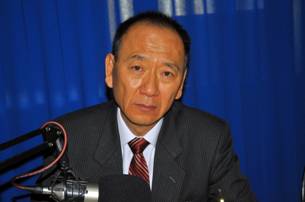
DUSHANBE, 26.05.2020. (NIAT Khovar) – With the beginning of 2020, the world faces a powerful cataclysm in the form of the COVID-19 pandemic. Most politicians and experts agree that after the pandemic the world will be completely different. Speaking with Khovar’s Russian service Editor Elena Batenkova, Junior researcher at the Institute of Philosophy, Political Science and Law of the Tajik National Academy of Sciences and Chairman of Association of Koreans in Tajikistan Victor Kim concurred.
Batenkova: What lessons can be learned from a pandemic?
Kim: One must admit that the COVID-19 pandemic in the first three months of this year practically halted the international situation in the world and put every state in the same crisis condition at the same time, with each country seeking its own way of solving the problem.
According to the first results, we can already conclude that from the point of view of healthcare, only Asian countries have positive experience — China, South Korea, Japan, Singapore and Vietnam. From the point of view of global politics, only China and the USA will have positive experience so far, with each choosing its own way of mobilizing the internal resources of society and the state to solve world politics.
Is everything so complicated?
The complexity of the current situation in the world lies in the fact that, until now, a unified approach against the coronavirus pandemic has not been developed. Various forecasts are being made about the end of the pandemic and about the new changes that the countries can expect. Also, established stable outlooks on life are being destroyed, seemingly unshakable and fundamental, national, ideological and even religious canons, traditions, values are being revised, the world outlook and relations in society, in the state, as well as international relations in the world are changing.
How can Tajikistan be in such a difficult and unpredictable situation in the world?
A lot has been said on the topic of the COVID-19 pandemic in Tajikistan. Everything was expressed, from government agencies to representatives of international organizations on how to effectively counter the spread of the pandemic in Tajikistan. Various conflicting tips from incompetent citizens confuse and mislead both the public and state authorities. In China, everything is simple and clear — there is tough centralized power. In Tajikistan, democratic norms and principles are respected and were even respected during wartime in the 1990s.
As practice shows, society supports preventative measures including the donning of masks and the rejection of the usual handshakes and maintaining distance.
Do you have any other recommendations?
I can propose informing the population about the epidemiological situation in the republic using all media and social networks, which, in principle, is now being done, but doing so on a daily basis; to broadcasting only simple and clear recommendations; to politely insists other keep a distance in public places; and to revive the Tajik experience of the “dialogue platform” – to implement public initiatives and ideas with the involvement of the state and the people.
Do you think that the restrictions that have been introduced are sufficient?
I think so. If the government officially declares “strict quarantine measures” with “mandatory self-isolation,” then the economic crisis and social tensions in Tajikistan cannot be avoided. It is more expedient to require wearing of masks, maintaining social distance, observing personal hygiene and public sanitation rules. The practice of other countries shows that these are the most important proven methods of curbing the pandemic. In this regard, I fully support the “soft quarantine” chosen by the Tajik government.
What is your forecast regarding Tajikistan after the pandemic?
Any forecasting is an ungrateful and unreliable business. If you remember, the development of political processes after independence in 1991 was very specific, it was not subject to logic, therefore, until 2010, professional analysts and experts could not forecast political events in Tajikistan for more than a year. Since 2010, the political processes have already begun to acquire certain logical contours and obey certain laws. The scientific approach to this problem already allows us to predict the development of the political processes for the next five to ten years.
Economic problems or food shortages which may be expected following the pandemic, according to some international experts, I believe, will not be critical for Tajikistan. The population still remembers what hunger is in times of crisis and how to survive in such conditions. Therefore, during this period it is more important to solve the problems of economics, agriculture, questions of unity and harmony of society and the state.
Based on this, it can be said that the current formula of the political system of Tajikistan will contribute to stability in the state and society.











 Lonely Planet Includes Tajikistan among the World’s Best Travel Experiences
Lonely Planet Includes Tajikistan among the World’s Best Travel Experiences Emomali Rahmon and Xi Jinping Highlight Significance of Launching Direct Passenger Flights between Dushanbe and Beijing
Emomali Rahmon and Xi Jinping Highlight Significance of Launching Direct Passenger Flights between Dushanbe and Beijing American Environmentalist Caroline Gleich Praises Tajikistan’s Leadership in Glaciers’ Protection
American Environmentalist Caroline Gleich Praises Tajikistan’s Leadership in Glaciers’ Protection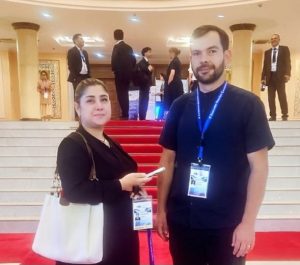 Tajikistan Provides Key Platform for Science–Policy Dialogue on Glacier Preservation, Says UCA Researcher
Tajikistan Provides Key Platform for Science–Policy Dialogue on Glacier Preservation, Says UCA Researcher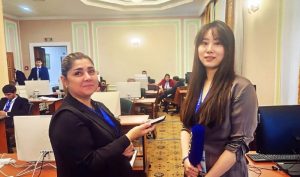 CGTN Journalist Praises Tajikistan’s Leadership on Glaciers’ Issues and Highlights China-Tajikistan Cooperation
CGTN Journalist Praises Tajikistan’s Leadership on Glaciers’ Issues and Highlights China-Tajikistan Cooperation UN Women Official Stresses the Role of Women in Climate Action at Glaciers’ Conference in Dushanbe
UN Women Official Stresses the Role of Women in Climate Action at Glaciers’ Conference in Dushanbe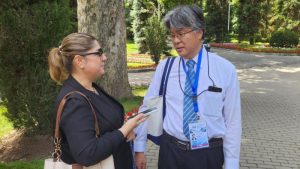 Japanese Researcher Highlights Tajikistan’s Role in Regional Water Security at High-Level Glaciers’ Conference
Japanese Researcher Highlights Tajikistan’s Role in Regional Water Security at High-Level Glaciers’ Conference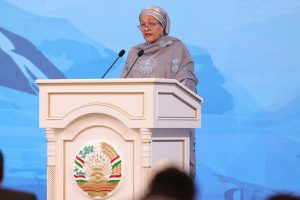 “This is Not Just Ice – This is Life”: UN Deputy Chief Calls for Urgent Action at Glaciers Conference in Dushanbe
“This is Not Just Ice – This is Life”: UN Deputy Chief Calls for Urgent Action at Glaciers Conference in Dushanbe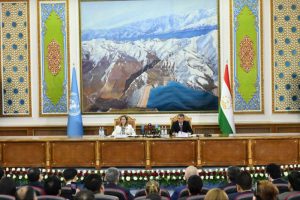 Dushanbe Hosts Landmark International High-Level Conference on Glaciers’ Preservation
Dushanbe Hosts Landmark International High-Level Conference on Glaciers’ Preservation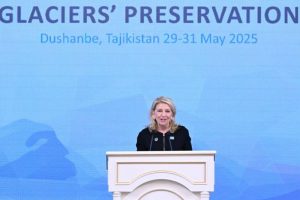 The Climate Crisis Is Primarily a Crisis of Children’s Rights
The Climate Crisis Is Primarily a Crisis of Children’s Rights Chinese Scientist Highlights Glacier Retreat as a Tangible Reality for Tajikistan, the Region, and the World
Chinese Scientist Highlights Glacier Retreat as a Tangible Reality for Tajikistan, the Region, and the World Dushanbe Conference Launches New Era in Global Glacier Diplomacy
Dushanbe Conference Launches New Era in Global Glacier Diplomacy














